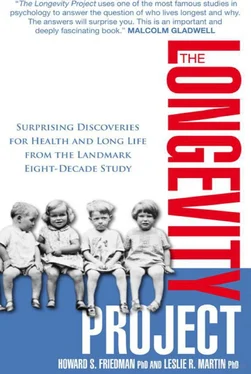There is little doubt that breast-feeding is usually healthy for infants, especially those who are at high risk for illness or are from poor families living in less than optimal conditions. Breast-feeding provides a rich source of nutrients and of protective antibodies, and it can help launch a healthy and continuing mother-child attachment. But how large are the benefits for infants who have access to excellent nutrition without breast-feeding and who are growing up in stable families with sufficient resources to provide a clean, safe environment? Is breast-feeding one of those “must-do” activities that has major long-term effects, or is it one of those behaviors in the long list of things that are helpful but nowhere near essential in promoting a long, healthy life?
The Terman children provided an answer. We knew that studying them could put breast-feeding into the greater context of their lives. We gathered information, originally collected from the parents, on breast-feeding in almost 1,200 of the Terman participants.
Many behaviors and processes associated with breast-feeding, both biological and social, could be relevant to health across the decades. But the simplest and most powerful analysis would ask whether the breast-fed Terman children lived longer and whether they were less likely to die of any particular diseases.
Consistent with other research, we did find that breast-feeding was associated with better infant health. But what about the long term? It turned out that breast-feeding made little difference. There were some indications that the breast-fed males were a little healthier, but no clear patterns really existed. Breast-feeding also seemed, after careful examination, to be unrelated to personality. 33 33 For our breast-feeding study see D. L. Wingard, K. H. Criqui, S. Edelstein, J. Tucker, C. Tomlinson-Keasey, J. E. Schwartz, and H. S. Friedman,“Is Breast-Feeding in Infancy associated with Adult Longevity?” American Journal of Public Health 84 (1994): 1458-62.
All in all, our findings, coupled with the scientific evidence provided by others, suggest that breast-feeding is likely a healthful practice; but in developed areas with good nutrition, it is unlikely to be more than a very minor influence on long-term health and longevity in adulthood.
Things got more interesting when we examined early education. Aside from our families, the most important early influences on our paths to health are school and friendships. Infants possess many newly forming abilities and predispositions—some arising from genes and others coming from in-the-womb experiences (such as exposure to hormones) and the early home environment. Some of the Terman infants were active and some were more relaxed; some were shy and some were intrinsically curious about other children. But beyond the influences of these predispositions and our early home lives, it is predominantly in school and among peers that we begin to shape lifelong patterns of competition or cooperation, perseverance or impulsivity, isolation or social integration, and activity or passivity. These patterns, in turn, are linked to later health and longevity.
Before we turn to our examination of the Terman children’s early education, pause a moment to reflect on your own early experiences—and answer about yourself some of the same questions the Terman participants’ parents answered about them.
SELF-ASSESSMENT: EARLY SCHOOL
Answer the five following questions.
Did you go to preschool?
At what age did you enter regular school (first grade)?
Did you learn to read before starting school?
Was your primary (elementary) school rigid and competitive?
Did you ever skip a grade?
Although all these answers relate to academic progress and achievement, it turns out that it doesn’t make sense to add them all together to get an overall score. In fact, as we explored these elements in more detail we found that they were quite different in terms of their relation to mortality risk. So, as we continue, keep your answers in mind.
The Terman children were capable of being good students, and in grade school most of them excelled in literature, composition, history, science, and debate. But they were average or worse in art, shop, and penmanship. That is, Dr. Terman was the first scientist to find real evidence for the common stereotype that all those future doctors, lawyers, and engineers, whatever their other talents, would be sorely lacking in the domain of legible script.
Philip, a precocious but fidgety boy, was enrolled in first grade right at age five. Because they were academically well qualified, a number of the Terman children, like Philip, started school early or skipped a grade.
In contrast, Linda went to kindergarten at age five and started first grade at the normal, traditional age of six, even though she was a very bright and mature girl. Would Linda have been better off if she had gotten a jump on formal schooling? Could something like starting school early or late affect long-term health and longevity?
Traditionally, in America, children attend kindergarten at age five and enter the first grade at age six. (This is not directly dependent on whether they have attended preschool.) Not surprisingly, approximately half the Terman participants entered first grade and started formal schooling at about age six. But a significant number entered school at an earlier age—at age five or even a bit younger than that. Their parents thought they were bright and “ready” for school—they wanted their children to learn as much as possible as soon as possible. Linda’s mother, like some other parents, was in no hurry. And she didn’t want Linda to be younger than her classmates.
Was Linda’s mother on to something or was she being overly cautious? On the one hand, kids who are younger than their classmates can develop low self-esteem and find themselves without adequate grounding for the adolescent scene when they enter middle school. On the other hand, intellectually advanced kids who enter school with peers their own age can become bored and develop behavior problems as a result. So, led by the efforts of Peggy Kern, then a graduate student, we tracked the effects of the starting age on health and longevity across the decades. 34 34 For our study of early education and long life, see: M. L. Kern and H. S. Friedman, “Early Educational Milestones as Predictors of Lifelong Academic Achievement, Midlife Adjustment, and Longevity,” Journal of Applied Developmental Psychology 30 (2009): 419-30.
We found that those Terman participants who started school at a very early age tended to encounter difficulties throughout their lives. For example, the early-starting boys like Philip were somewhat less likely to grow up to be very well-adjusted adults, and the early-starting girls were more likely to later abuse alcohol.
And surprisingly enough, their age at entering school predicted the subjects’ longevity, too. The children who started first grade at age five were at higher risk of dying early, and those who started school on schedule (at age six) lived longer. Just as we had discovered that an element of childhood personality—conscientiousness—was very relevant to health decades later, we now saw that something as seemingly unrelated to health as a school starting age could also tell us something about a person’s chances of living a long life.
There was no single ingredient that explained the increased risk for those who started school at a younger-than-average age. Indeed, many of these precocious Terman participants did live long and healthy lives. But it was a mark that something could go very wrong if the children were pushed too far, too fast. Because relating to classmates is so important for children, an out-of-sync start can launch some of them down some erratic paths. We concluded that parents should not enroll their kids at age five in an attempt to give them an advantage. Getting an early start—jumping ahead of one’s peers—is a dead-end myth.
Читать дальше











